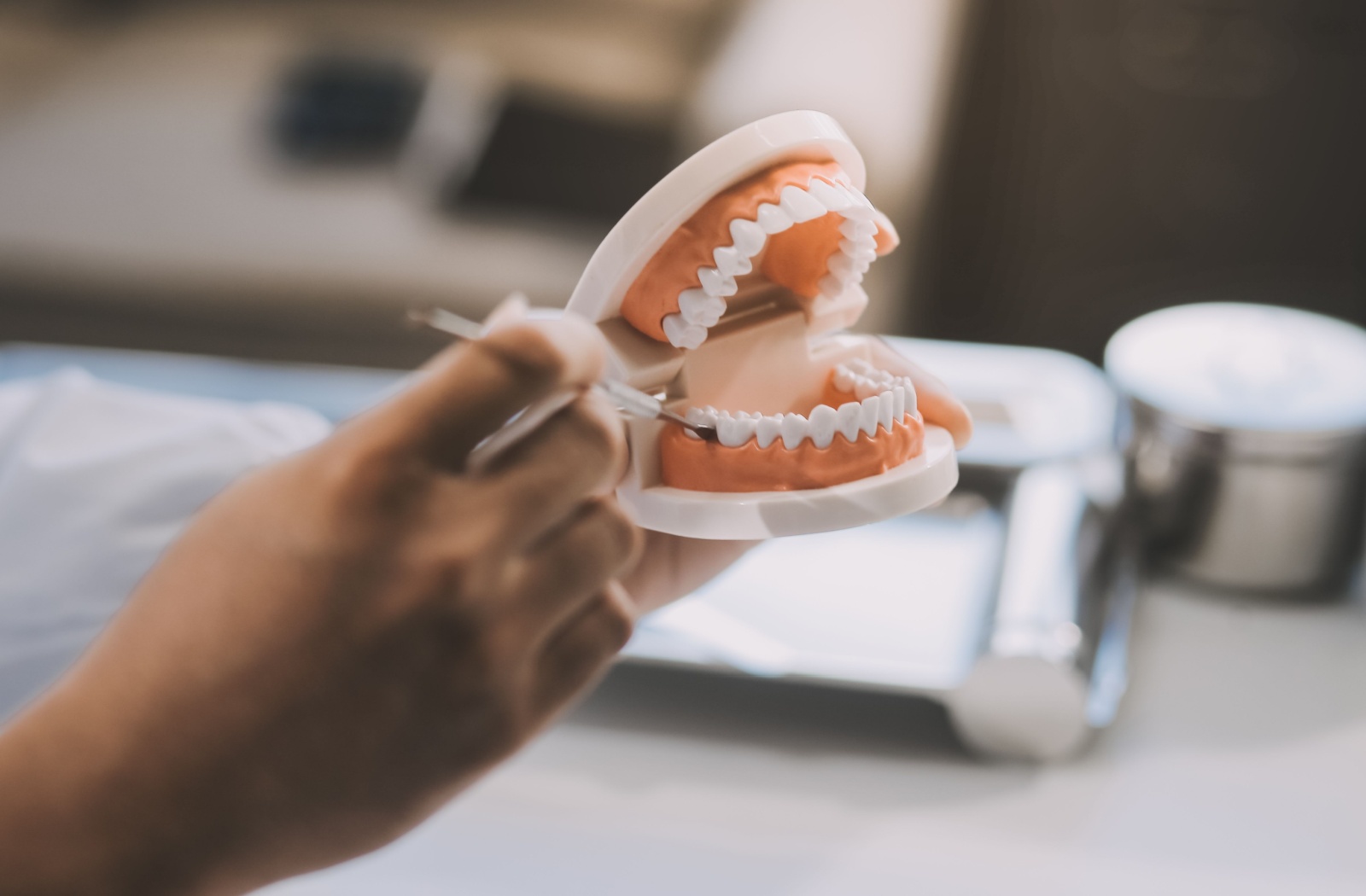How Long Do Dentures Last?

Dentures are a popular solution for those with missing teeth, offering a functional and aesthetic replacement for your natural teeth and gums.
Whether you’re considering dentures or already wearing them, you may wonder how long they will last and how to maintain them for a longer lifespan.
Dentures typically last between 5–10 years for complete dentures and up to 15 years for partial dentures, depending on how well they are cared for.
Your dentist can help you protect your dentures and oral health so you can enjoy the benefits for longer.
Types of Dentures: What You Need to Know
There are 2 main types of dentures: complete and partial.
- Complete dentures are designed to replace an entire arch of teeth when all of a patient’s natural teeth are missing
- Partial dentures are custom-designed to fit around your existing natural teeth & can be easily removed
Both denture types offer essential benefits, such as helping you speak and eat normally. The lifespan of each varies based on several factors.
How Long Do Dentures Last?
On average, dentures can last anywhere from 5 to 10 years for complete dentures, while partial dentures can last up to 15 years. However, the longevity of your dentures depends on how well you care for them.
The fit of your dentures may change over time due to natural changes in your mouth, such as gum recession and bone loss. Changes to oral structures can affect the comfort and function of your dentures, so periodic adjustments may be necessary.
Factors That Affect the Lifespan of Dentures
A few key factors can impact how long your dentures last and the quality you experience throughout their use.
Wear & Tear
Just like natural teeth, dentures are subject to daily wear. Regular use, eating certain foods, and biting forces can gradually wear down the material.
Oral Changes
Over time, your gums and jawbone can change, which may cause dentures to lose their personalized fit. These changes can affect comfort and function.
Care & Maintenance
Proper cleaning and handling of dentures can significantly impact their durability. Consistently following care guidelines helps maintain their shape and functionality.
How to Care for Your Dentures
Proper care is crucial to enhancing the lifespan of your dentures. You can help keep your dentures in good condition with consistent oral hygiene practices.
1. Handle Your Dentures With Care
While it may seem like common sense, carefully handling your dentures is essential. Dentures can break or warp if dropped or mishandled.
You can reduce the risk of drop damage by placing a towel or mat underneath when handling them or filling the sink with water.
2. Clean Your Dentures Regularly
Just as you would with natural teeth, dentures need regular cleaning to remove food particles, plaque, and bacteria. After each meal, rinse your dentures under warm water to remove food debris.
Avoid using harsh materials like abrasive cleaners or bleach, as they can scratch the surface of the dentures and irritate your gums.
When cleaning your dentures, use a soft toothbrush or soft-bristled brush specifically designed for dentures. Using the right tool helps prevent surface scratches while thoroughly cleaning the dentures.
3. Soak Your Dentures Overnight
Most dentures require moisture to maintain their shape and integrity. It’s recommended to soak your dentures overnight in water or a denture-cleaning solution to prevent them from drying out and losing their form.
Rinse your dentures thoroughly before putting them back in your mouth.
4. Avoid Hot Water
Never soak your dentures in hot water, as this can cause them to warp. Always use lukewarm or room-temperature water for soaking.
5. Clean Your Gums & Mouth
Before placing your dentures back into your mouth, clean your gums, tongue, and any remaining natural teeth. Thorough cleanings help prevent bacteria or debris from transferring back into your mouth.

What to Do If Your Dentures Are Damaged
Contact your denturist or dentist if your dentures become damaged, cracked, or loose. Attempting to repair or reline dentures yourself can lead to further damage or discomfort.
Your dentist can assess the damage and determine the next steps for repair or replacement if necessary.
How to Tell If You Need New Dentures
Over time, dentures may show signs of wear that indicate it’s time for a replacement or adjustment. Here are some signs to look out for:
- Loose or slipping dentures that shift out of place may mean your dentures no longer fit properly
- Difficulty speaking or chewing can indicate your dentures are no longer supporting your mouth correctly
- Discomfort or irritation while wearing your dentures can indicate a poor fit
- Obvious damage like cracks, chips, or worn-down teeth are clear signs your dentures need attention
- Discolouration, stains, or marks that can’t be cleaned off are signs you need a replacement
- Gum irritation & redness in your gums after wearing dentures can indicate poor fit or damage
Protecting the Longevity & Comfort of Your Dentures
Your dentures are an investment in your oral health. With consistent, appropriate care, dentures can provide long-lasting benefits for eating, speaking, and smiling. If you notice any changes in the fit or comfort of your dentures, don’t hesitate to visit your denturist for advice or adjustments.
At Hayven Dentures, we’re here to help you maintain the health and function of your dentures. If you have any questions or want to discuss getting dentures or repairs, contact us today to book a consultation. Our friendly team is here to support your smile.